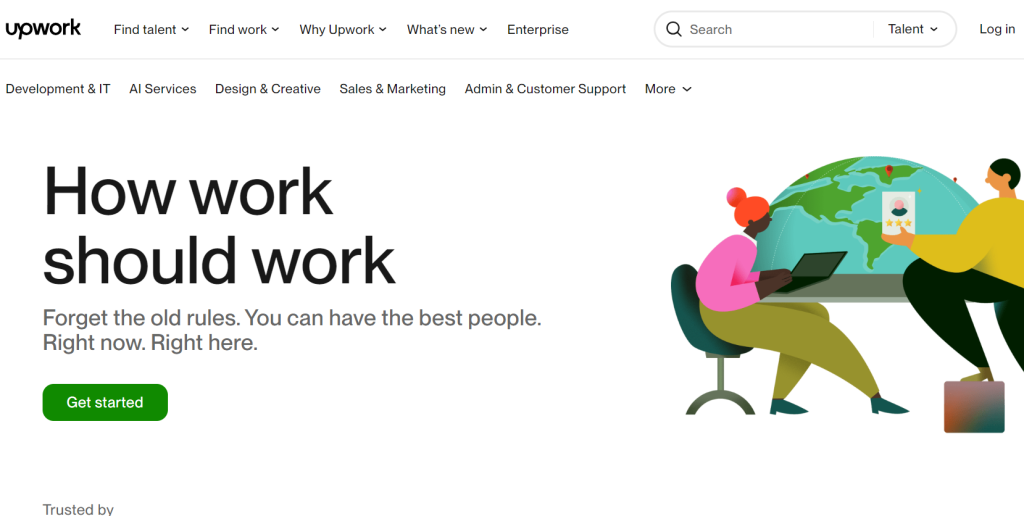How to Secure Remote Work: A Guide to Trusted Online

The landscape of work has changed dramatically over the past few years. Remote work is no longer a trend; it’s now a fundamental part of our professional lives. Whether you’re a freelancer, entrepreneur, or part of a global team, the ability to collaborate from anywhere offers incredible flexibility and freedom.
However, with this newfound liberty comes significant responsibility. As we embrace remote working arrangements, ensuring security and trust in online platforms becomes paramount. The internet is filled with opportunities but also risks that can compromise your work and personal information.
Navigating these waters might feel daunting at times, but fear not! This guide will walk you through securing your remote work experience by highlighting trusted platforms designed for seamless collaboration while keeping your data safe. Let’s dive into the world of secure remote work together!
The Rise of Remote Work
Remote work has surged ahead, reshaping how we think about jobs and workplaces. With advancements in technology, people can connect from all corners of the globe.
The COVID-19 pandemic acted as a catalyst for this shift. Companies were forced to adapt quickly to remote operations, proving that productivity could thrive outside traditional office settings. Many employees found themselves enjoying the benefits of flexible hours and reduced commute times.
As businesses realized the cost savings associated with remote teams, they began embracing this model long-term. The digital nomad lifestyle gained traction too, inspiring professionals to blend work with travel.
Now more than ever, individuals are seeking roles that offer autonomy and balance. This transformation highlights not just a change in where we work but also how we perceive our careers and lives moving forward.
Benefits and Challenges of Working Remotely
Working remotely offers flexibility that traditional offices can’t match. You can set your hours, create a comfortable workspace, and often enjoy a better work-life balance. This freedom can lead to increased productivity and job satisfaction.
However, remote work isn’t without its challenges. The lack of face-to-face interaction may foster feelings of isolation among workers. Communication barriers might arise when relying solely on digital channels.
Distractions at home are another hurdle. Household chores or family obligations can disrupt focus and reduce efficiency.
Additionally, the blurred lines between personal time and work hours may lead to burnout if not managed well. Recognizing these upsides and downsides is crucial for anyone considering a shift to remote work arrangements.
Importance of Secure Platforms for Remote Work

As remote work becomes the norm, securing your digital workspace is crucial. Without proper security measures, sensitive information can easily fall into the wrong hands.
Trusted platforms provide built-in security features that protect user data. They often use encryption to safeguard communications and transactions. This layer of protection makes a significant difference in maintaining confidentiality.
Moreover, secure platforms offer authentication options like two-factor verification. These additional steps help ensure that only authorized users access important files and accounts.
Working on unverified sites increases vulnerability to cyberattacks and scams. Choosing a reputable platform helps mitigate these risks significantly.
It’s essential to prioritize safety while enjoying the flexibility of remote work. Investing time in selecting secure tools pays off by fostering trust among team members and clients alike.
Trusted Online Platforms for Remote Work
When it comes to remote work, choosing the right platform is crucial. There are several options available, each catering to different needs and industries.
Freelancers can explore platforms like Fiverr and Freelancer. These sites offer a variety of gigs, allowing professionals to showcase their skills while connecting with clients worldwide.
For companies seeking dedicated talent, Toptal stands out. It focuses on vetting candidates thoroughly, ensuring top-tier freelancers for projects that demand high expertise.
If project management is key, consider using tools like Trello or Asana. They facilitate team collaboration and help keep tasks organized across various locations.
Communication plays an essential role in remote settings. Platforms such as Slack and Zoom enable seamless interaction among team members, regardless of where they are based.
Each platform has its unique strengths tailored for specific requirements in the ever-evolving landscape of remote work.
Our Recommendation: Upwork

When it comes to finding a reliable platform for remote work, Upwork stands out. This site connects freelancers with clients across various industries. With thousands of job postings available daily, the opportunities are vast.
One of the key features is its robust system for ensuring secure transactions between freelancers and clients. Upwork uses escrow services that protect both parties financially until the work is completed satisfactorily. This builds trust in an environment where security can sometimes be uncertain.
Additionally, Upwork offers tools for communication and project management, making collaboration smoother than ever. Whether you’re a freelancer or hiring talent, having these resources at your fingertips enhances productivity.
The user-friendly interface allows easy navigation through profiles and portfolios. You can find professionals who match your skills perfectly or showcase your own talents effectively to potential employers.
With strong customer support and a commitment to maintaining fair practices within its community, Upwork remains one of the top choices in remote work platforms today. If you’re looking for a space where you can thrive while working remotely, consider giving Upwork a try; it might just be what you need to elevate your career journey.



